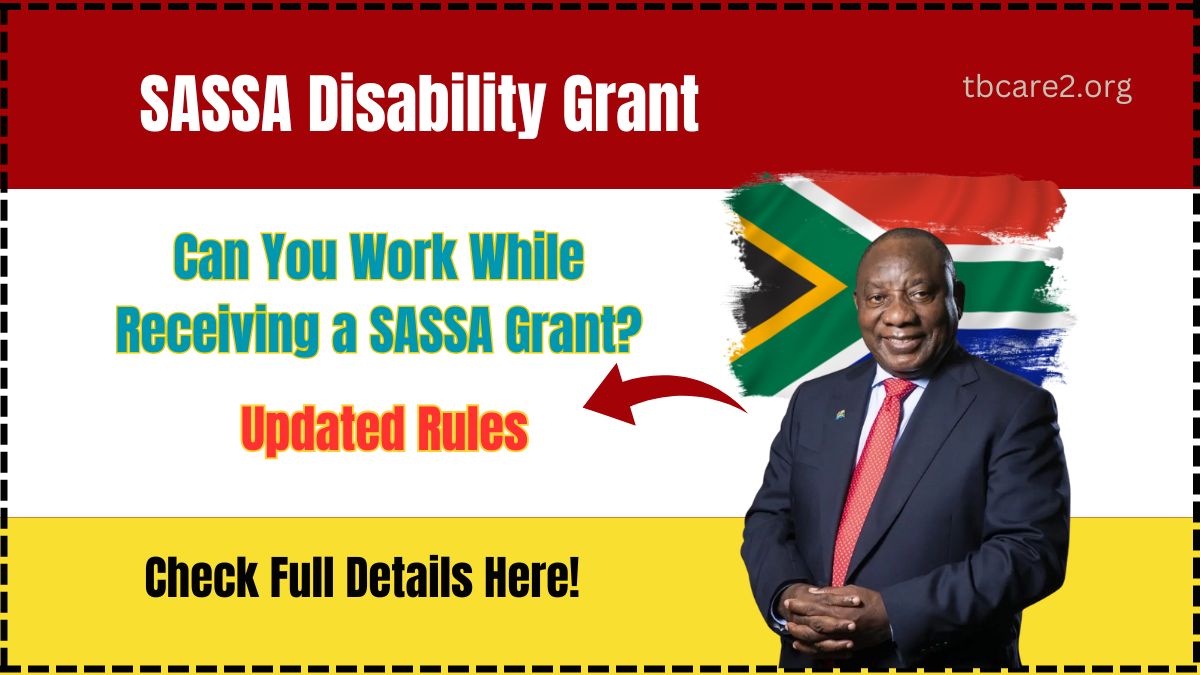The South African Social Security Agency (SASSA) plays a pivotal role in providing financial assistance to individuals unable to work due to physical or mental disabilities.
For recipients of the SASSA Disability Grant, questions often arise about the possibility of supplementing their grant with part-time employment.
With updated rules and requirements, understanding this balance is essential to maintaining eligibility.
Contents
Understanding the SASSA Disability Grant
The SASSA Disability Grant is a monthly cash grant aimed at providing financial relief for individuals who cannot fully support themselves due to medical limitations.
Its primary goal is to ensure basic needs like food, clothing, and shelter are met, offering recipients financial independence and dignity.
Key Features of the Disability Grant
- Type: Monthly cash grant.
- Purpose: Cover essential living expenses (food, clothing, shelter).
- Intended Beneficiaries: Adults aged 18-59 with disabilities.
Eligibility Criteria for the SASSA Disability Grant
To qualify for the SASSA Disability Grant, applicants must meet the following criteria:
| Criterion | Details |
|---|---|
| Medical Condition | Must have a severe physical or mental disability that limits work ability. |
| Age | Applicants must be aged between 18 and 59. |
| Residency | Must be a South African citizen, permanent resident, or refugee. |
| Income Threshold | Monthly income below R12,000 (single) or R24,000 (couple). |
| Asset Limits | Assets must not exceed R350,000 (single) or R1,000,000 (couple). |
A medical assessment is mandatory to verify the severity of the disability. The grant is only available to those whose condition significantly impacts their ability to earn a living.
Can You Work Part-Time and Still Qualify for a SASSA Grant?
Yes, part-time employment is allowed while receiving the SASSA Disability Grant, but strict rules govern this arrangement.
Income Limits
Part-time work is permitted, provided the combined income (grant + part-time wages) does not exceed the income threshold set by SASSA. If your total income surpasses this limit, your eligibility for the grant may be revoked.
Reporting Requirements
You are required to report all sources of income, including part-time earnings, to SASSA. Failure to disclose income may lead to:
- Penalties.
- Repayment of received funds.
- Disqualification from future assistance.
Periodic Assessments
SASSA conducts regular financial assessments. If your income exceeds the permissible limit during these evaluations, your grant could be suspended or cancelled.
Tips for Maintaining Eligibility While Working
- Keep Accurate Records: Document all income earned from part-time employment.
- Consult SASSA: If you are unsure about your eligibility, contact SASSA for clarification.
- Report Changes Immediately: Notify SASSA promptly of any changes in income or employment status.
Application Process for the SASSA Disability Grant
If you meet the eligibility criteria, follow these steps to apply:
- Gather Required Documents
- Identity Documents (ID).
- Medical Assessment Reports.
- Proof of Income or Assets.
- Complete the Application Form
- Obtain the form from your local SASSA office or download it from their website.
- Submit the Application
- Visit your local SASSA office with the completed form and supporting documents.
- Await Feedback
- SASSA will process your application, which may include follow-up evaluations or additional documentation requests.
Common Reasons for Rejection
- Missing or incorrect documents.
- Income exceeding the allowable threshold.
- Insufficient medical proof of disability.
Impacts of Part-Time Work on Your Grant
While part-time work is allowed, it comes with conditions:
- Income Monitoring: SASSA evaluates your total income regularly.
- Reporting Changes: Any increase in income or employment status must be reported immediately.
Consequences of Non-Compliance
Failure to report changes may lead to:
- Repayment of grant funds.
- Permanent disqualification from the program.
| Aspect | Details |
|---|---|
| Income Changes | Must be reported immediately to SASSA. |
| Reporting Method | Visit the SASSA office where you submitted your application. |
| Consequences of Failure | Penalties, repayment of funds, or disqualification from future assistance. |
The SASSA Disability Grant is a vital source of financial support for individuals with disabilities. While part-time work is permitted, strict income limits and reporting requirements must be adhered to, ensuring that the grant continues to provide the necessary assistance without interruptions.
By maintaining transparency and following SASSA’s guidelines, recipients can achieve a balance between supplemental income and grant eligibility.
Can I Work Full-Time and Still Receive the SASSA Disability Grant?
No, full-time work typically exceeds the income threshold, making you ineligible for the grant.
What Happens If I Don’t Report My Part-Time Income?
Failure to report income may result in penalties, repayment of funds, or disqualification.
How Often Does SASSA Review My Income?
SASSA conducts periodic assessments to ensure income remains within permissible limits.







